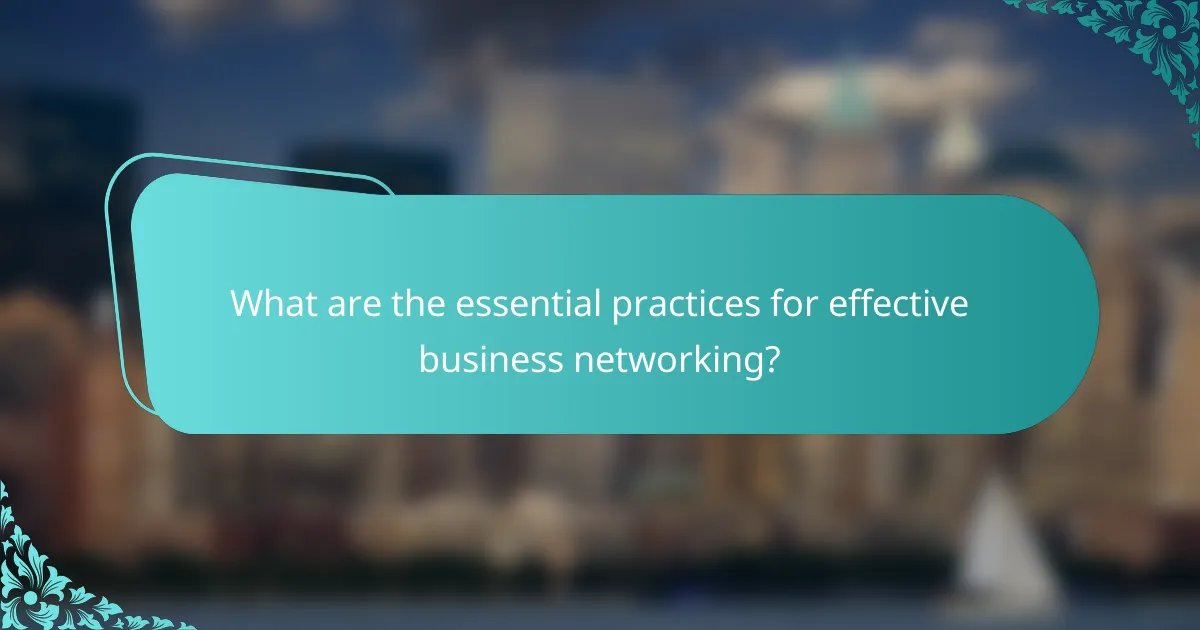The Vermont Chamber of Commerce is a nonprofit organization that advocates for businesses in Vermont, providing essential resources for networking, education, and legislative support. Founded in 1918, it focuses on promoting economic growth and enhancing the business climate within the state. The article outlines effective business networking etiquette and essential practices, emphasizing the importance of building genuine relationships, active listening, and consistent engagement in networking events. It also highlights strategies for maximizing networking opportunities, including preparing an elevator pitch, utilizing social media, and joining professional organizations to foster meaningful connections.

What is the Vermont Chamber of Commerce?
The Vermont Chamber of Commerce is a nonprofit organization that advocates for businesses in Vermont. It serves as a resource for networking, education, and legislative support. The Chamber aims to promote economic growth and improve the business climate in the state. Founded in 1918, it has a long history of supporting local businesses. The organization provides various services, including business resources, training programs, and events. Its membership includes a diverse range of businesses across different sectors. The Vermont Chamber also engages in policy discussions to represent business interests at the state level. Through these efforts, it fosters a collaborative environment for business development in Vermont.
How does the Vermont Chamber of Commerce support local businesses?
The Vermont Chamber of Commerce supports local businesses through advocacy, networking opportunities, and resources. The organization advocates for policies that benefit the local business community. It provides networking events that connect business owners with potential clients and partners. The Chamber offers educational resources and workshops to help businesses grow. It also shares valuable information about market trends and economic conditions. Membership in the Chamber gives businesses access to exclusive discounts and services. These initiatives contribute to a thriving local economy.
What services are offered by the Vermont Chamber of Commerce?
The Vermont Chamber of Commerce offers various services to support businesses. These services include advocacy for business interests at the state level. They provide networking opportunities through events and forums. The chamber also offers educational resources and training programs. Members gain access to marketing and promotional assistance. Business referrals are a key service, connecting members to potential clients. The chamber provides information on business regulations and compliance. Additionally, they offer resources for professional development and growth. These services aim to enhance the business environment in Vermont.
How does membership in the Vermont Chamber of Commerce benefit businesses?
Membership in the Vermont Chamber of Commerce provides businesses with numerous benefits. It offers networking opportunities that connect members with other local businesses and potential clients. Members gain access to exclusive events and workshops that enhance their business skills. The chamber also advocates for local businesses at the state level, influencing policy decisions. In addition, members receive valuable resources, such as market research and business development tools. According to the Vermont Chamber’s statistics, businesses that engage actively report increased visibility and growth. Overall, membership supports business sustainability and community engagement.
Why is business networking important in Vermont?
Business networking is important in Vermont because it fosters local economic growth and collaboration. Vermont has a unique small business landscape, with many entrepreneurs relying on community support. Networking helps businesses create valuable connections for partnerships and referrals. It also provides access to resources, mentorship, and industry insights. According to the Vermont Chamber of Commerce, networking events can lead to increased visibility and opportunities for local businesses. Engaging in networking enhances the overall business ecosystem, contributing to job creation and innovation in the region.
What are the key advantages of networking for Vermont businesses?
Networking provides Vermont businesses with opportunities for collaboration, resource sharing, and community engagement. It allows local businesses to build relationships that can lead to partnerships. These partnerships can enhance visibility and credibility within the community. Networking also facilitates access to new markets and customer bases. According to a survey by the Vermont Chamber of Commerce, 70% of businesses reported increased sales through networking efforts. Additionally, networking events often provide valuable insights and trends impacting the local economy. This exchange of information can foster innovation and improve business strategies. Overall, networking is essential for growth and sustainability in Vermont’s business landscape.
How does networking contribute to business growth in Vermont?
Networking contributes to business growth in Vermont by facilitating connections among local entrepreneurs. These connections lead to partnerships that can enhance resources and capabilities. Increased visibility in the community can result from networking events, attracting potential customers. Networking also provides access to valuable industry insights and trends. Local businesses can leverage these insights to adapt strategies effectively. Additionally, referrals from established contacts can generate new leads. According to the Vermont Chamber of Commerce, 75% of new business opportunities arise from networking. This statistic underscores the significance of building relationships for growth.

What are the essential practices for effective business networking?
Effective business networking requires building genuine relationships. This involves actively listening to others during conversations. Engaging with people on a personal level fosters trust. Attending networking events consistently increases visibility within your industry. Following up after meetings is crucial to maintaining connections. Offering help and support to others strengthens professional ties. Being authentic and approachable encourages open communication. Lastly, setting clear networking goals helps focus efforts on meaningful interactions.
What etiquette should be followed during networking events?
During networking events, individuals should prioritize professionalism and respect. Attendees must dress appropriately for the occasion to create a positive impression. Engaging in active listening is crucial, as it shows genuine interest in others. Maintaining eye contact during conversations fosters connection and trust. It’s essential to introduce oneself clearly and provide a firm handshake. Avoid monopolizing conversations; instead, encourage others to share their insights. Following up after the event with a thank-you message reinforces connections made. According to a study by the Harvard Business Review, effective networking can significantly enhance career opportunities.
How can one prepare for a networking event?
To prepare for a networking event, one should research attendees and companies beforehand. This helps identify potential connections and conversation starters. Additionally, practicing an elevator pitch is essential. A concise introduction highlights key professional achievements. Dressing appropriately for the event’s setting is also important. First impressions significantly impact networking success. Bringing business cards ensures easy sharing of contact information. Following up with connections after the event reinforces relationships. According to the Vermont Chamber of Commerce, effective preparation enhances networking outcomes.
What are common networking mistakes to avoid?
Common networking mistakes to avoid include failing to follow up with contacts. This can lead to missed opportunities for collaboration. Another mistake is focusing solely on personal gain. Networking should be mutually beneficial. Additionally, neglecting to listen actively can hinder relationship building. Engaging in one-sided conversations reduces connection potential. Moreover, being unprepared with an elevator pitch can create a negative impression. A clear introduction is essential for effective networking. Lastly, attending events without a goal can waste time and resources. Setting specific objectives helps maximize networking efforts.
How can businesses foster meaningful connections through networking?
Businesses can foster meaningful connections through networking by actively engaging with others and building trust. They should prioritize authentic interactions over transactional exchanges. Attending industry events and local meetups encourages face-to-face connections. Following up after initial meetings reinforces relationships. Sharing valuable insights and resources demonstrates genuine interest. Participating in community initiatives showcases commitment to local engagement. Utilizing social media platforms enhances visibility and ongoing communication. Research indicates that 85% of jobs are filled through networking, highlighting its importance in building professional relationships.
What strategies enhance relationship-building in networking?
Effective strategies for enhancing relationship-building in networking include active listening, genuine engagement, and follow-up communication. Active listening involves fully concentrating on the speaker, which fosters trust and understanding. Genuine engagement means showing authentic interest in others’ experiences and perspectives. Following up after initial meetings solidifies connections and shows commitment. Research indicates that maintaining contact increases the likelihood of future collaborations. Networking events often lead to long-term professional relationships when these strategies are applied consistently.
How can follow-up communication strengthen networking ties?
Follow-up communication strengthens networking ties by reinforcing connections made during initial interactions. It demonstrates genuine interest in the relationship. Regular follow-ups can lead to deeper conversations and shared opportunities. According to a study by the Harvard Business Review, consistent follow-up increases the likelihood of future collaborations. Engaging through emails or messages keeps the connection alive. It also provides a chance to share relevant information or resources. This ongoing dialogue fosters trust and rapport. Ultimately, strong networking ties can lead to professional growth and new business opportunities.

What are the best tips for maximizing networking opportunities?
To maximize networking opportunities, engage actively in conversations. Approach individuals with genuine interest. Prepare an elevator pitch that highlights your skills. Attend industry events regularly to expand your connections. Follow up promptly with new contacts to reinforce relationships. Utilize social media platforms like LinkedIn to maintain connections. Offer assistance or value to others in your network. Join professional organizations to meet like-minded individuals. These strategies enhance visibility and create meaningful connections.
How can businesses effectively leverage the Vermont Chamber of Commerce for networking?
Businesses can effectively leverage the Vermont Chamber of Commerce for networking by participating in events and utilizing member resources. Engaging in networking events provides direct access to local business leaders. This facilitates relationship building and potential partnerships. Businesses can also join committees to increase visibility and influence within the community. Utilizing the Chamber’s online directory allows for targeted outreach to other members. Additionally, attending workshops and seminars enhances knowledge and showcases expertise. The Vermont Chamber of Commerce hosts over 100 events annually, offering numerous opportunities for connection. These strategies collectively foster a robust professional network.
What specific events should businesses attend for optimal networking?
Businesses should attend industry conferences and trade shows for optimal networking. These events gather professionals from specific sectors. They offer opportunities to connect with potential clients and partners. Networking events hosted by local chambers of commerce are also valuable. They foster community relationships and collaboration. Workshops and seminars provide targeted learning and networking opportunities. Business expos showcase products and services while facilitating connections. Attending these events can lead to strategic partnerships and growth.
How can businesses utilize online platforms for networking?
Businesses can utilize online platforms for networking by creating professional profiles and engaging in relevant groups. These platforms allow businesses to showcase their services and connect with potential clients. Engaging in discussions can enhance visibility and establish authority in the industry. Networking events hosted online can facilitate direct interaction with other professionals. Utilizing features like messaging and video calls can foster deeper connections. According to LinkedIn’s data, 80% of professionals consider networking important for career success. This statistic highlights the value of online networking for business growth.
What common challenges do businesses face in networking, and how can they be overcome?
Businesses commonly face challenges in networking such as lack of confidence, difficulty in building relationships, and ineffective communication. Lack of confidence can hinder engagement with potential contacts. To overcome this, businesses can practice their networking skills in low-pressure environments. Difficulty in building relationships often arises from a lack of follow-up. Consistent follow-up after initial meetings can help strengthen connections. Ineffective communication can lead to misunderstandings and missed opportunities. Businesses can improve communication by actively listening and tailoring their message to their audience. These strategies can effectively address common networking challenges.
What resources are available for improving networking skills?
Resources available for improving networking skills include workshops, online courses, and networking events. The Vermont Chamber of Commerce offers various workshops focused on effective communication and relationship building. Online platforms like LinkedIn Learning provide courses on networking strategies. Local business networking events allow individuals to practice their skills in real-world settings. Additionally, books on networking techniques can offer valuable insights. These resources help individuals enhance their networking abilities through practical experience and expert guidance.
How can businesses measure the success of their networking efforts?
Businesses can measure the success of their networking efforts through various metrics. One effective method is tracking the number of new contacts made during networking events. This can indicate the expansion of the business’s professional network. Additionally, businesses can evaluate the quality of connections established. This involves assessing how many of these contacts lead to potential partnerships or collaborations.
Another key metric is the conversion rate of networking contacts into clients or customers. A higher conversion rate signifies successful networking efforts. Businesses should also monitor the growth in referrals received from networking connections. Increased referrals can reflect the strength of relationships built through networking.
Surveys or feedback from networking participants can provide insights into perceived value and effectiveness. This qualitative data can complement quantitative measures. Finally, analyzing social media engagement and online interactions resulting from networking can also serve as a valuable indicator of success.
The Vermont Chamber of Commerce is a nonprofit organization dedicated to supporting local businesses through advocacy, networking opportunities, and valuable resources. This article outlines the essential practices and etiquette for effective business networking, emphasizing the importance of building genuine relationships and engaging in community initiatives. Key topics include the benefits of Chamber membership, effective networking strategies, common challenges faced by businesses, and resources available for improving networking skills. Additionally, the article discusses how businesses can leverage the Vermont Chamber of Commerce to enhance their networking efforts and measure the success of these initiatives.


